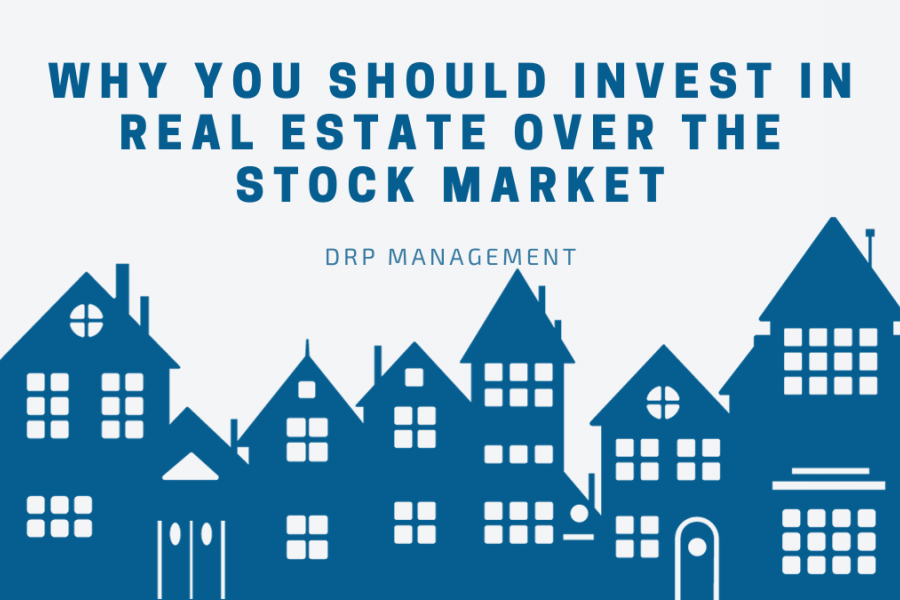
Landlords, have you ever considered the advantages of investing in real estate compared to the stock market?
In the world of investments, it's crucial to weigh your options carefully, and for many, real estate emerges as a superior choice. This article delves into the compelling reasons why real estate investment can be more beneficial than navigating the often unpredictable stock market.
From tangible assets and steady income streams to tax advantages and inflation hedging, real estate offers a unique blend of security and growth potential. Join us as we explore why real estate investment is a smart move for landlords like you.
Reasons To Invest in Real Estate
Here is a list of reasons to consider investing in real estate over stock market:
Stable and Continuous Income from Real Estate
Real estate investment stands out primarily for its ability to generate stable and continuous revenue. This is particularly true for rental properties, both residential and commercial.
Unlike speculative land investments, which may not yield immediate income, rental properties can start providing a steady monthly income quickly after acquisition.
This aspect of real estate is starkly different from stocks, where returns are typically realised only when they are sold. Dividends from stocks, while often providing some profit, are usually less significant than rental income.
For landlords, this means a more predictable and reliable source of income, essential for long-term financial planning.

Professional Management Makes Real Estate Less Daunting
The prospect of managing a real estate investment, with its myriad of responsibilities like tenant acquisition, maintenance, and dealing with legalities, might seem daunting. However, this challenge is mitigated by the availability of professional property management services.
These companies take over day-to-day management, leveraging their expertise to increase the profitability of your investment.
This is a significant advantage over stock investments, where although you can entrust your portfolio to a fund manager, the fees might not correlate with the same level of direct benefit that a property manager can provide to a real estate investment.
Real Estate: A Less Risky Investment Option
Real estate is generally less susceptible to the rapid fluctuations that characterise the stock market. This stability makes it a safer bet against inflation, ensuring that your investment retains its value over time.
In well-chosen locations, the appreciation rate of real estate often outpaces inflation, safeguarding your financial investment.
Stocks, conversely, can be quite volatile, with values that can swing dramatically in short periods. This makes them a riskier and more stressful investment choice for those who prefer financial predictability.
Appreciation Trends in Real Estate
Over time, real estate investments have shown a consistent upward trend in value. While market downturns do occur, such as the 2008 housing crisis, these are typically not the norm and often represent temporary dips in value.

Real estate investments offer the unique benefit of being improvable; strategic renovations and upgrades can significantly increase a property’s market value, enhancing the return on investment. This aspect of value addition is largely absent in stock investments.
Tax Benefits Unique to Real Estate Investments
The tax advantages of real estate investments are substantial when compared to stocks.
Real estate investors can enjoy deductions on mortgage interest, property taxes, operating expenses, and depreciation, which can significantly reduce taxable income.
These benefits are particularly advantageous for rental property owners, allowing them to maximise their returns in a way that is not possible with stock investments.
Deferring Taxes Through Real Estate Investment Strategies
Unique to real estate is the ability to defer capital gains tax through mechanisms like the 1031 Exchange.
This allows investors to reinvest the proceeds from a property sale into another property, deferring taxes on any gains.
Such tax-deferral options are not typically available with stocks, where capital gains tax is often immediately applicable upon sale.
Key Points To Consider
When considering investing in real estate, landlords should keep several key factors in mind to ensure they make informed and profitable decisions.

Here are some important considerations:
- Location: The location of a property is crucial in real estate investing. Factors like neighbourhood quality, local amenities, schools, crime rates, and access to public transport can significantly impact the property's value and attractiveness to potential renters.
- Type of Property: Decide what type of property you want to invest in, such as single-family homes, multi-family units, commercial properties, or vacation rentals. Each type has its own set of benefits and challenges.
- Market Research: Conduct thorough research to understand the local real estate market, including supply and demand dynamics, average rent prices, occupancy rates, and future development plans in the area.
- Financial Analysis: Evaluate your financial situation and determine your budget. Consider not only the purchase price but additional costs such as taxes, insurance, maintenance, and potential property management fees as well.
- Rental Income Potential: Assess the potential rental income to ensure it covers your mortgage payments, operating expenses, and provides a reasonable return on investment. Calculate the property’s yield and consider whether it meets your income goals.
- Property Condition: Evaluate the condition of the property. A fixer-upper may be cheaper initially but could require significant investment in repairs and renovations. A turnkey property, while more expensive, might be rentable immediately.
- Legal and Tax Implications: Understand the legal requirements and tax implications of owning a rental property. This includes landlord-tenant laws, lease agreements, and the tax benefits and obligations associated with property ownership.
Conclusion
Investing in real estate offers a tangible asset with the potential for steady income and appreciation, often outpacing the volatility of the stock market. It's an investment that allows for more control and personal involvement.
To fully leverage this opportunity, consider partnering with a professional property management company. DRP Management stands out as a reliable choice in this regard. They offer expertise and services that can maximise your investment's potential while minimising the day-to-day hassles.
Trusting DRP Management with your property can provide peace of mind and ensure that your real estate investment is not just profitable but also hassle-free.
